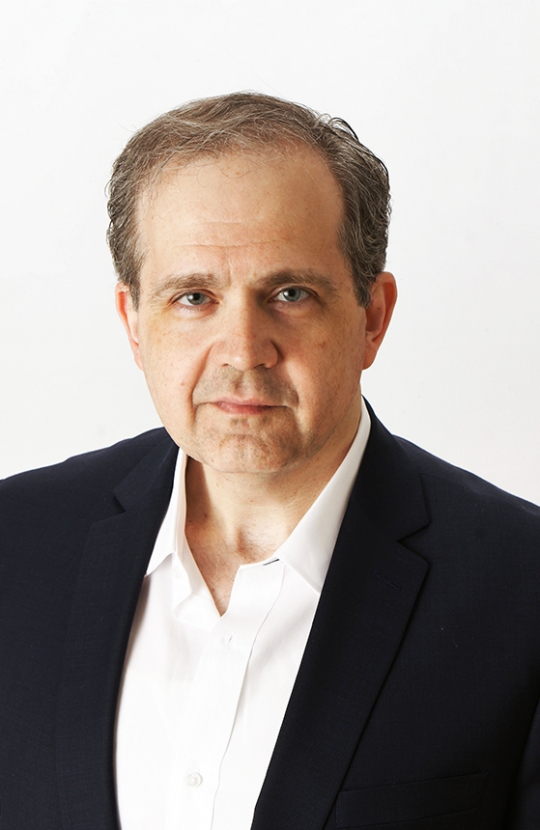 Conspiracy theories, vampires, Barbies, and UFOS. What do they all have in common? The answer is Barna Donovan, Ph.D.
Conspiracy theories, vampires, Barbies, and UFOS. What do they all have in common? The answer is Barna Donovan, Ph.D.
Donovan serves as director of the graduate program in communication and public relations at Saint Peter’s University. In a recent interview, he shared some of the details about what he studies, what he teaches, and his inspiration for it all.
What are some of the recent publications for which you have shared your expertise?
During the Covid-19 pandemic, I was interviewed about the various conspiracy theories around the coronavirus and its origins. I also commented on QAnon and whether the movement would have staying power in years to come.
I commented on the history of the UFO phenomenon and the classification system for alleged alien encounters when the media took interest in the Pentagon’s clandestine study efforts of unidentified aerial phenomena.
I have also discussed the history of the Dungeons and Dragons role-playing game in a Hollywood Spotlight special edition magazine, which was released before the premiere of the new film, Dungeons and Dragons: Honor Among Thieves. In another special edition magazine on the history of vampires in legend, literature and film, I discussed the cultural history of the famous monsters and why they keep recurring in horror stories.
I am also extensively quoted in Hollywood Spotlight magazine’s special edition on Barbie. Released upon the debut of last summer’s film, I discussed the history of the development of the doll and the various controversies about female representation and body images throughout the decades.
Of all these subjects, is there one that is of particular interest to you?
I study film, audiences, conspiracy theories, and how popular entertainment both reflects and shapes conspiratorial beliefs in the real world. In today’s society, people feel powerless at the whims of increasingly intrusive communication and online technologies, government surveillance, and a general sense of a loss of privacy. I am seeking to understand how this ever-more complex and alienating world is creating an entirely new belief system that is akin to a new religion for a world of paranoia. Whereas traditional religions argue that unseen and unknowable deities steer the world toward a positive end, the dark gods of conspiracism manipulate the world toward discord, division, oppression and violence.
But ultimately, I am seeking to understand and teach the most effective means to counter the falsehoods and illogical fear-mongering of conspiracism, and to train effective and ethical professional communicators who will stand in opposition to a vast cyberspace full of charlatans and liars spreading misinformation for profit and self-aggrandizement.
What sparked your interest in conspiracy theories?
My interest in this topic actually started from my studies of fandom and fan communities. My book, Blood, Guns, and Testosterone: Action Films, Audiences, and a Taste for Violence, looked at the fan communities of action/adventure films, with a particular focus on how active audiences are, meaning that people will bring very personal, idiosyncratic, even oppositional interpretations to entertainment whose messages we might think are fairly obvious.
People can often see and remember and interpret entertainment as they would like to, and not always the way it was intended. I started noticing these kinds of behaviors in people who subscribe to the most convoluted, overly complex, and just absurdly unlikely conspiracy theory scenarios.
For conspiracy believers, I realized as I looked closer and closer at these communities, reality itself had become a text to be reinterpreted and rewritten. The entire history of conspiracy beliefs reveals a series of reinterpretations of world events by the true believers. If the authorities say a lone gunman killed President John F. Kennedy, some people immediately reject that conclusion and replace it with complicated plots of grand cabals of conspirators. If authorities say we went to the moon, conspiracy theorists will say that we did not. If authorities say Osama bin Laden and al-Qaeda were behind the 9/11 attacks, conspiracy theorists will say it was really all a secret plot by the “globalists,” “the insiders,” the “New World Order,” or the Illuminati.
I had come to realize that the staunchest conspiracy believers were not much different than avid Star Trek fans who write their fan fiction by altering the characters and universe of Captain Kirk and the U.S.S. Enterprise. Conspiracy theorists are just rewriting the evening newscasts: they are rejecting and rewriting a real world of empirical science, data and facts in such a way as to confirm their own wish-fulfillment fantasies of the real world.
Are any of these subjects incorporated into your coursework?
I teach a course on the history of conspiracy theories and their representation in films, but the conspiracy theme is also applicable to my courses in horror and science fiction films. As I discuss with my students, the fear of conspiracies is so profound in modern American culture that it permeates multiple entertainment genres.
In my course, “Ethics in Communication,” the theme of conspiracy theories has been especially pertinent over the last several years. Conspiracism’s manipulative distortion of facts and its malicious spread of lies about the Covid-19 pandemic and vaccination efforts perfectly illustrates the tenet that the most basic requirement for ethical communication is honesty. Ethical communicators, in turn, must challenge and expose misinformation and deliberately manipulative communication when they encounter it.
In courses I teach for our Master’s program in communication and public relations, questions of truth, honesty and the need to combat the dangers of misinformation in cyberspace while preserving free speech are also explored. People seeking a degree in professional, corporate or governmental communication, especially in areas dealing with health and science, are taught to use their communication skills to counter the conspiratorial attacks on reason and science. Science and rationality are all too often under attack by conspiratorial misinformation and communication specialists are the ones with the tools to help combat this misinformation.
